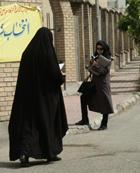
Sociologist Nahid Motie has done research on the Iranian women’s movement, and especially the traditional organisations. Humanitarian work has long traditions in Iran, and is according to national values and Islam. To serve the people is looked upon as a holy and religious duty, and gives the participants a good reputation. Iranian women have been very active in this kind of work. The women have served the people through relief work, charity organisations and through education and health- and social services for poor families.
Food, work and care
The traditional women’s organisations are closely connected to the local communities and are doing many types of work, tells Motie. They have survived through many regimes and ages, and have proved themselves through time. At the same time they do not receive the recognition and the visibility that they deserve, Motie thinks. Many of them are involved in activities that give work to women. But they are looked upon as old fashioned and are being criticized for creating dependency through charity.
The traditional women’s organisations have many types of activities: there are production oriented organisations that are involved in agricultural work, fruit-growing, live stock and water supply, but also production of commodities in the cities. Women cooperatives were established when women felt marginalized in male dominated cooperatives, that had little tolerance for women’s participation in administration and management. The cooperatives give income to poor families, especially female-headed households. The cooperatives also assist in securing education and health and social services to children.
The traditional women’s organisations also include charity organisations, that give care and support to poor families, as widows, orphans, handicapped people, and families that have experienced natural and social disasters. Motie also tells that women were active participants in the Islamic revolution in 1979, and as supporters for the army in the war between Iran and Iraq in the 80s. There are also religious institutions headed by women, some of these also give cheap loans to women or emergency relief.
Feminism, human rights and development
After the reform friendly Khatami was elected president in 1997 he has taken initiative to strengthen the civil society of Iran. This emphasis on ngos is a strategy for social, political and economical development. Since 1997 many hundred small and large more modern women NGOs have been established. The government divides then into several categories:
Social and political organisations, cultural and educational groups, religious minorities, refugee organisations, professionals (journalists, lawyers and so on), international groups, semi governmental institutions and publications.
Nahid Motie thinks that the modern women’s groups have little contact with the people in the communities. She thinks they can learn a lot from the more traditional women’s organisations. The modern women’s organisations have no strategy to reach out to the people, which is something Motie thinks is necessary in order to achieve something. She also claims that the government initiated modern organisations have been started from political reasons, and that the main aim for the authorities is to show that all is well for Iranian women, that progress is good and activities high.
Motie elaborates further on the difficulties that the new women’s movement faces. The main problem is the conflict of roles that the women who are active in the movement have to face. Socially they have been trained to do supportive tasks in the private domain, but when they participate in social movements, they must adapt to a new role that is very different from the traditional one, which is the mother and the wife. This is a challenge that women in many countries have had to face, while it is not the case for men, because they have been more active in the public sphere.
Another obstacle for the women’s movement is the reformist movement that has been strong in Iran the last years. Motie thinks that many women activists are too closely connected to this movement, which wants to wait with women’s issues until other problems in the society are solved. Motie also thinks there is a problem with the lack of knowledge about feminism and feministic theory, many people claim that these are western ideas that do not meet the needs of Iranian women. Finally there is a problem for the women’s movement that there is too little cooperation between the new women’s organisations. There is a gap between academic women and the more traditional thinking women activists. They do not cooperate well, and have a negative image of each other. The movement also toils with the generation gap between older and younger women.
In addition comes the problem of the lack of contact between the old and the new women’s organisations. The traditional ones do not understand feminism, and the modern have little respect for the old groups.
Motie thinks that the strategy for achievement in women’s issues is to establish dialogue between the traditional and the more modern women’s organisations. But this dialogue must not be dominated by the modern organisations, says Nahid Motie.
Nina Kristiansen is director of KILDEN, Norwegian Information and Documentation Centre for Women's Studies and Gender Research. She stayed for five months in Iran in the spring of 2003.
Nahid Motie is associate professor in sociology at the Open University in Tehran. She is also a member of the NGO Independent Researchers on Women’s Issues. This network aims to gather feminist researchers from different fields of study to exchange research experiences and learn from each other. One activity of the NGO has been to publish the report: Beijing+5: Iranian Women Researchers' Independent Study.